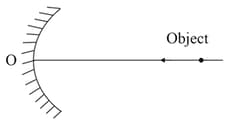Image Formation in Spherical Mirror
Image Formation in Spherical Mirror: Overview
This topic covers concepts, such as, Important Rays for the Formation of Images in a Spherical Mirror, Sign Convention in Mirrors, Procedure for Ray Diagrams for Point and Extended Objects & Conjugate Points in Spherical Mirror etc.
Important Questions on Image Formation in Spherical Mirror
An object is placed in front of a convex mirror at a distance of 50 cm. A plane mirror is introduced covering the lower half of the convex mirror. If the distance between the object and the plane mirror is 30 cm, it is found that there is no gap between the images formed by the two mirrors. The radius of the convex mirror is:
A large temple has a depression in one wall. On the floor plan, it appears as an indentation having a spherical shape of radius . A worshipper stands on the centreline of the depression, out from its deepest point, and whispers a prayer. Where is the sound concentrated after reflection from the black wall of the depression?
A thin road of length d/3 is placed along the principal axis of a concave mirror of focal length = d such that its image, which is real and elongated, just touches the rod. Find the length of the image?
What is meant by extended object?
What is a point object example?
An object is placed at from the concave mirror of focal length the nature of the image and magnification will be
An object is placed at a distance of from a convex mirror of focal length . The image distance is
Two plane mirrors are inclined at an angle of . An object is placed between the mirror. The no. of images formed by two mirrors is
The focal length of a concave mirror is . An object is placed at a distance from the focus and form a real image. Therefore, the magnification is
An object is kept at a distance of from a concave mirror, For getting a magnitication of , focal length of the concave mirror required is
An object of size , placed in front of a spherical mirror at, forms an image of size above the principal axis. Find out the focal length with sign convention and the type of spherical mirror used?
The radius of curvature of concave mirror is and the image is magnetic by times. The object distance is
The ration of the speed of an object to the speed of its real image of magnification in the case of convex mirror is
Concave mirror produces an image which is three times as large as the object placed at a distance of from it. For the image to be real, the focal length should be
At what distance should object kept to obtain image distance of thrice the focal length of diverging mirror?
What can be the largest distance ( in centimetres) of an image of a real object from a convex mirror of radius of curvature ?
Name the point where all the incident rays coming parallel to the principal axis meet after reflection from a concave mirror.
(Center of curvature/ focus).
The radius of curvature of a convex spherical mirror is How far away from the mirror is an object, if the distance between its virtual image and the mirror is What is the height of the image?
[Apply formula for paraxial rays]
A point object is moving along principal axis of a concave mirror with uniform velocity towards pole. Initially the object is at infinite distance from pole on right side of the mirror as shown. Before the object collides with mirror, the number of times at which the distance between object and its image is are.

A small candle, in size is placed at in front of a concave mirror of radius of curvature . Find focal length of the mirror. At what distance from the mirror should a screen be placed in order to obtain a sharp image?
